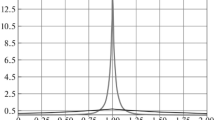Abstract
There is a paradox in the model of social dynamics determined by voting in a stochastic environment (the ViSE model) called “pit of losses.” It consists in the fact that a series of democratic decisions may systematically lead the society to the states unacceptable for all the voters. The paper examines how this paradox can be neutralized by the presence in society of a group that votes for its benefit and can regulate the threshold of its claims. We obtain and analyze analytical results characterizing the welfare of the whole society, the group, and the other participants as functions of the said claims threshold.
Similar content being viewed by others
References
Chebotarev, P.Yu., Malyshev, V.A., Tsodikova, Ya.Yu., Loginov, A.K., Lezina, Z.M., and Afonkin, V.A, The Optimal Majority Threshold as a Function of the Coefficient of Variation of the Environment, Upravlen. Bol’shimi Sist., 2016, vol. 62, pp. 169–187.
Borzenko, V.I., Lezina, Z.M., Loginov, A.K., Tsodikova, Ya.Yu., and Chebotarev, P.Yu., Strategies of Voting in Stochastic Environment: Egoism and Collectivism, Autom. Remote Control, 2006, vol. 67, no. 2, pp. 311–328.
Mirkin, B.G., Group Choice, Fishburn, P.C., Ed., New York: Wiley, 1979.
McKelvey, R.D, Intransitivities in Multidimensional Voting Models and Some Implications for Agenda Control, J. Econom. Theory, 1976, vol. 12, no. 3, pp. 472–482.
Coughlin, P. and Nitzan, S, Directional and Local Electoral Equilibria with Probabilistic Voting, J. Econom. Theory, 1981, vol. 24, no. 2, pp. 226–239.
Chebotarev, P.Yu., Loginov, A.K., Tsodikova, Ya.Yu., Lezina, Z.M., and Borzenko, V.I, Voting in a Stochastic Environment: The Case of Two Groups, Autom. Remote Control, 2011, vol. 72, no. 7, pp. 1537–1547.
Palfrey, T.R. and Rosenthal, H, Voter Participation and Strategic Uncertainty, Am. Political Sci. Rev., 1985, vol. 79, no. 1, pp. 62–78.
Downs, A., An Economic Theory of Democracy, New York: Harper and Brothers, 1957.
Grofman, B, The Neglected Role of the Status Quo in Models of Issue Voting, J. Politics, 1985, vol. 47, no. 1, pp. 229–237.
Duggan, J. and Kalandrakis, T, Dynamic Legislative Policy Making, J. Econom. Theory, 2012, vol. 147, no. 5, pp. 1653–1688.
Penn, E.M, A Model of Farsighted Voting, Am. J. Polit. Sci., 2009, vol. 53, no. 1, pp. 36–54.
Dziuda, W. and Loeper, A, Voting Rules in a Changing Environment, SSRN paper 2500777, 2014. DOI: 10.2139/ssrn.2500777
Dziuda, W. and Loeper, A, Dynamic Collective Choice with Endogenous Status Quo, J. Polit. Economy, 2016, vol. 124, no. 4, pp. 1148–1186.
Chebotarev, P.Yu., Analytical Expression of the Expected Values of Capital at Voting in the Stochastic Environment, Autom. Remote Control, 2006, vol. 67, no. 3, pp. 480–492.
Chebotarev, P.Yu., Loginov, A.K., Tsodikova, Ya.Yu., Lezina, Z.M., and Borzenko, V.I, Snowball of Cooperation and Snowball Communism, Proc. Fourth Int. Conf. on Control Sciences, Moscow, Inst. Probl. Upravlen., 2009, pp. 687–699.
Author information
Authors and Affiliations
Corresponding author
Additional information
Original Russian Text © V.A. Malyshev, P.Yu. Chebotarev, 2017, published in Avtomatika i Telemekhanika, 2017, No. 6, pp. 157–172.
This paper was recommended for publication by A.L. Fradkov, a member of the Editorial Board
Rights and permissions
About this article
Cite this article
Malyshev, V.A., Chebotarev, P.Y. On optimal group claims at voting in a stochastic environment. Autom Remote Control 78, 1087–1100 (2017). https://doi.org/10.1134/S0005117917060091
Received:
Published:
Issue Date:
DOI: https://doi.org/10.1134/S0005117917060091




